12 Best Virtual Conference Platforms for 2025
Discover the 12 best virtual conference platforms for 2025. Our data-driven analysis helps you find the right tool for sponsorship and engagement.
Virtual conferences are a cornerstone of modern event strategy, offering unparalleled reach and data-collection opportunities. For conference organizers and corporate sponsors, selecting the right technology isn't just about streaming a keynote; it's about creating a digital ecosystem that fosters engagement, showcases sponsors effectively, and delivers measurable ROI. As the leading aggregator of conference and sponsorship data, we understand that the platform you choose directly impacts attendee experience, sponsorship value, and post-event analytics. This is a critical factor for successful events, so it's vital to consider how to improve customer engagement when making your selection.
This guide moves beyond surface-level marketing claims to provide a data-informed analysis of the 12 best virtual conference platforms. We focus on the features that matter most for audience interaction, sponsorship activation, and seamless technical execution. We'll dissect each platform, providing screenshots, direct links, and an honest assessment of its strengths and limitations. Our goal is to help you identify the right solution, whether you are managing a portfolio of large-scale hybrid events or searching for the right platform to attract and retain high-value sponsors. Let's find the platform that will maximize your event's success.
1. Zoom Events and Webinars
For organizations seeking a reliable and widely adopted solution, Zoom Events and Webinars stands out as one of the best virtual conference platforms due to its seamless integration into the existing Zoom ecosystem. It leverages a familiar user interface, which drastically reduces the learning curve for both organizers and attendees, making it ideal for rapid deployment. This platform is more than just a meeting tool; it's a comprehensive event stack designed for multi-session and multi-track conferences.
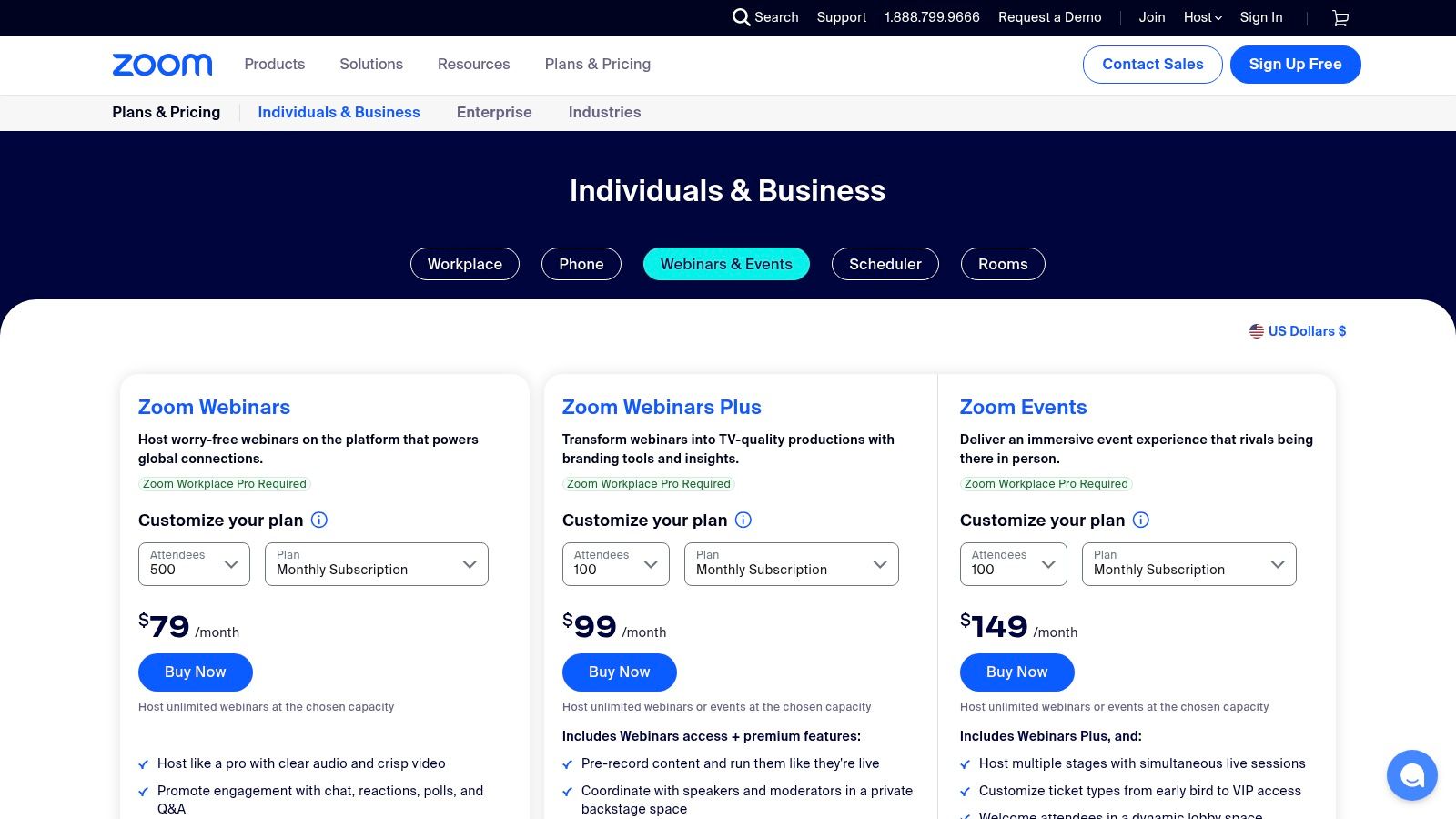
It excels at managing complex logistics with features like ticketing, registration pages, and detailed agendas. For sponsorship teams, the dedicated expo and sponsor areas provide valuable virtual real estate to showcase partners and generate ROI. The backstage controls give production teams a private space for speakers to prepare, ensuring a polished final presentation. For post-event analysis and content repurposing, robust recording capabilities are crucial. Learning how to record and transcribe your Zoom conference efficiently can unlock significant value from your session content.
Key Details & Use Case
- Best For: Organizations already using Zoom that need to scale up to full-featured conferences without a steep learning curve. Ideal for corporate town halls, trade association meetings, and multi-day industry summits.
- Pros: Familiar UX for most attendees, strong reliability at scale, and excellent third-party integrations.
- Cons: Advanced features like the expo floor are gated to higher-priced tiers, and the pay-per-attendee model can become costly for very large events.
- Pricing: View Zoom Events pricing
2. RingCentral Events (formerly Hopin Events)
For organizations seeking a mature and all-in-one solution, RingCentral Events emerges as one of the best virtual conference platforms, building upon the robust foundation of its predecessor, Hopin. It is engineered to handle complex, large-scale events with dedicated virtual venues that include a main stage, multi-track sessions, an interactive expo hall, and one-on-one networking. This structure provides sponsors with distinct, high-visibility opportunities to engage attendees, mimicking the value of a physical trade show floor.
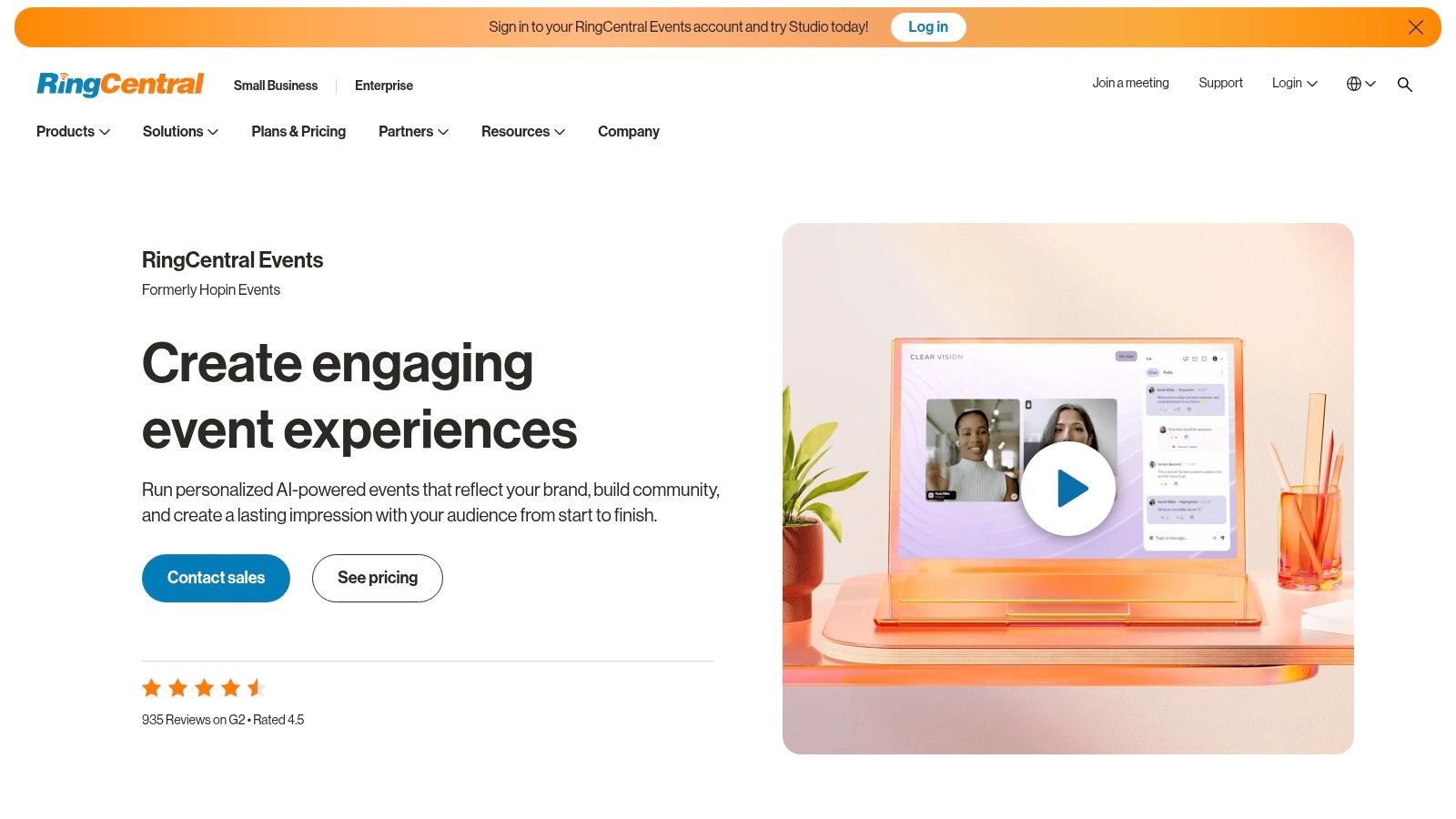
The platform shines in its ability to scale, supporting events with over 100,000 attendees while offering a predictable pricing model that appeals to budget-conscious planners. Many plans include unlimited events, making it a cost-effective choice for organizations with a packed event calendar. For sponsorship managers, the built-in ticketing, detailed analytics, and customizable sponsor booths provide the necessary tools to demonstrate clear ROI to partners. Its comprehensive feature set is designed to manage the entire event lifecycle from promotion to post-event analysis, making it a powerful contender.
Key Details & Use Case
- Best For: Mid-size to enterprise-level businesses that require a dedicated virtual venue with strong sponsorship and networking capabilities. It's an excellent fit for annual industry conferences, large-scale product launches, and virtual trade shows.
- Pros: Straightforward and predictable pricing models, a mature and refined feature set from its Hopin origins, and strong tools for sponsor engagement.
- Cons: The platform delivers the best experience when integrated into the broader RingCentral ecosystem, and pricing can vary based on the number of attendees per event.
- Pricing: View RingCentral Events pricing
3. Webex Events (formerly Socio)
For large enterprises already embedded in the Cisco ecosystem, Webex Events emerges as a powerful, end-to-end event management solution. Acquired as Socio, it has been fully integrated into the Webex Suite, offering a secure and comprehensive platform for virtual, hybrid, and in-person experiences. Its key distinction lies in its robust tooling for complex event logistics, including advanced registration, a polished mobile event app, and sophisticated networking and gamification features designed to drive attendee engagement.
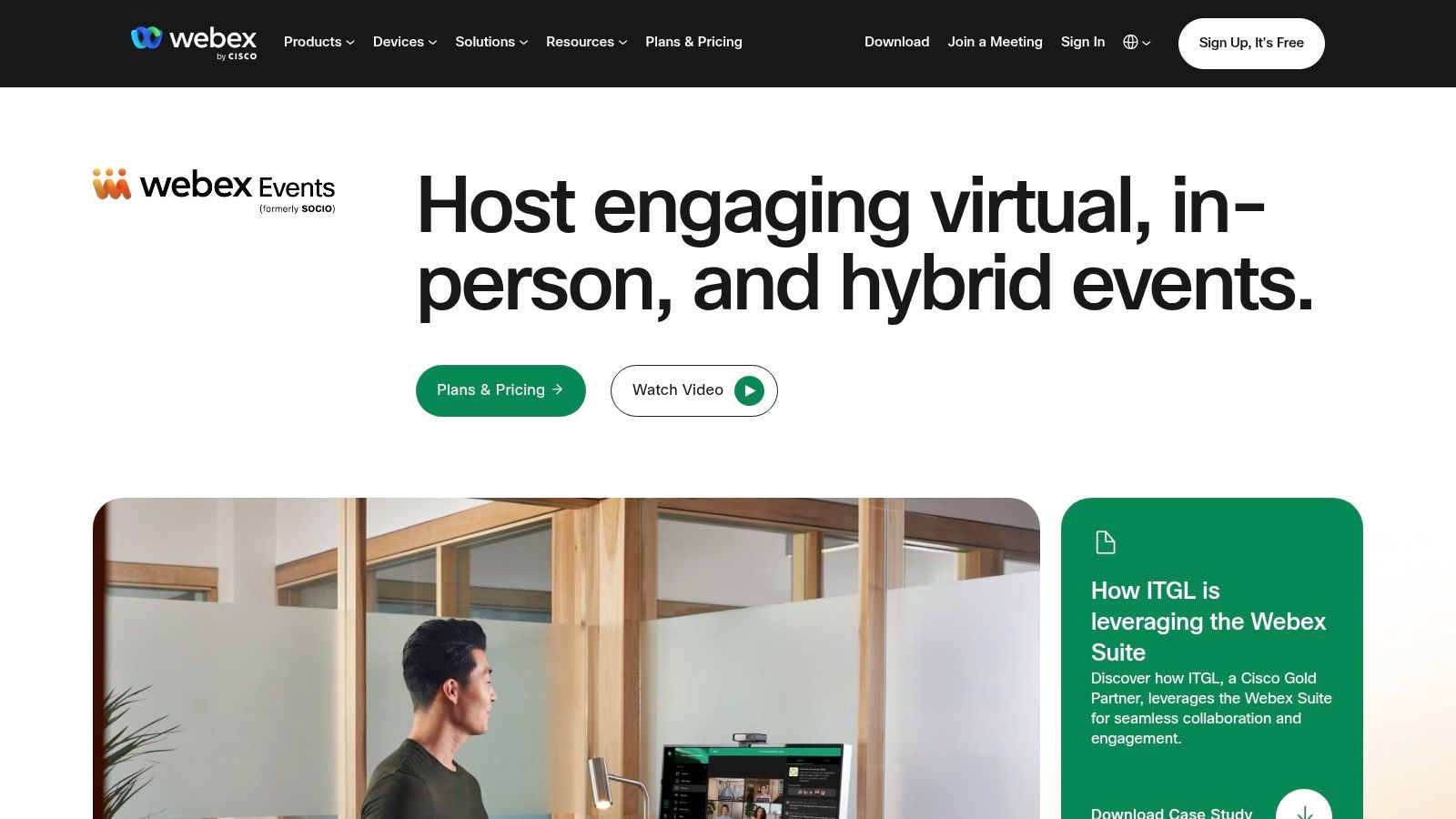
The platform is one of the best virtual conference platforms for sponsorship teams needing granular control and data. It provides dedicated tooling for sponsors and exhibitors, complete with detailed dashboards to track ROI and lead generation. This focus on data makes it invaluable for proving sponsorship value. Furthermore, its ability to deliver high-quality streaming with built-in accessibility and multilingual support ensures a professional and inclusive experience for a global audience, solidifying its place as a top-tier corporate solution.
Key Details & Use Case
- Best For: US-based enterprises heavily invested in the Webex Suite that require enterprise-grade security and a unified platform for managing complex virtual and hybrid conferences.
- Pros: Strong mobile app and hybrid workflow support, enterprise-grade security from Cisco, and detailed analytics for sponsorship ROI.
- Cons: No longer sold as a standalone product as of April 2024. Starting April 2025, it will only be available to Webex Suite Enterprise Agreement customers, limiting accessibility.
- Pricing: Contact Webex Sales for pricing
4. ON24 (Virtual Events, Webinars, Content Hubs)
For marketing and sales teams focused on demand generation and pipeline attribution, ON24 is one of the best virtual conference platforms. It is designed less as a standalone event tool and more as a data-driven engine for creating engaging digital experiences that produce first-party engagement insights. Its strength lies in its ability to track detailed audience interactions, providing sales teams with valuable data on lead quality and buying intent, which is a critical advantage for securing and proving ROI on sponsorships.
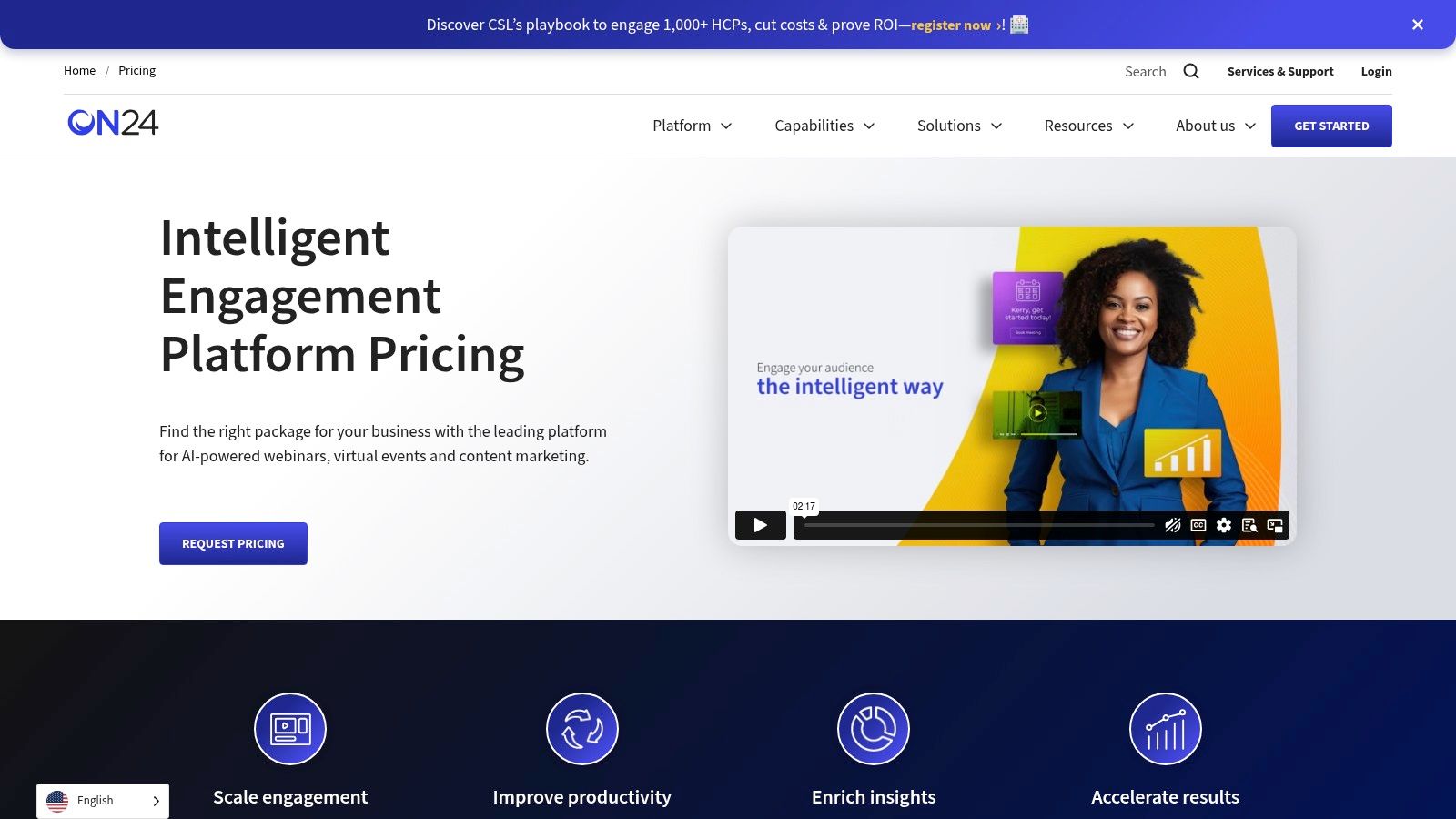
The platform supports complex virtual conferences with keynotes, breakouts, and dedicated sponsor areas. What truly sets it apart are the robust production workflows and deep integrations with marketing automation platforms and CRMs like Salesforce and Marketo. Features like AI-powered content repurposing and multi-language support extend the life and reach of conference content. This focus on analytics makes it a powerful tool for organizations where every event must be tied directly to revenue outcomes and sponsor value.
Key Details & Use Case
- Best For: Enterprise marketing teams that need to integrate virtual events directly into their revenue and demand generation funnels. Ideal for product marketing, lead generation webinars, and training events where audience engagement analytics are paramount.
- Pros: Deep, first-party analytics for pipeline and attribution, and robust production workflows for large-scale, polished events.
- Cons: Pricing is quote-based and aimed at the enterprise level, making it potentially excessive for smaller organizations or simple events.
- Pricing: View ON24 pricing
5. Airmeet
For event organizers prioritizing audience engagement and networking, Airmeet has carved out a space as one of the best virtual conference platforms. It is built from the ground up to facilitate meaningful connections, moving beyond passive viewing with features like virtual networking tables and speed networking lounges. This focus on interaction makes it exceptionally well-suited for community-driven events, industry summits, and expos where the value lies as much in the connections made as in the content presented.
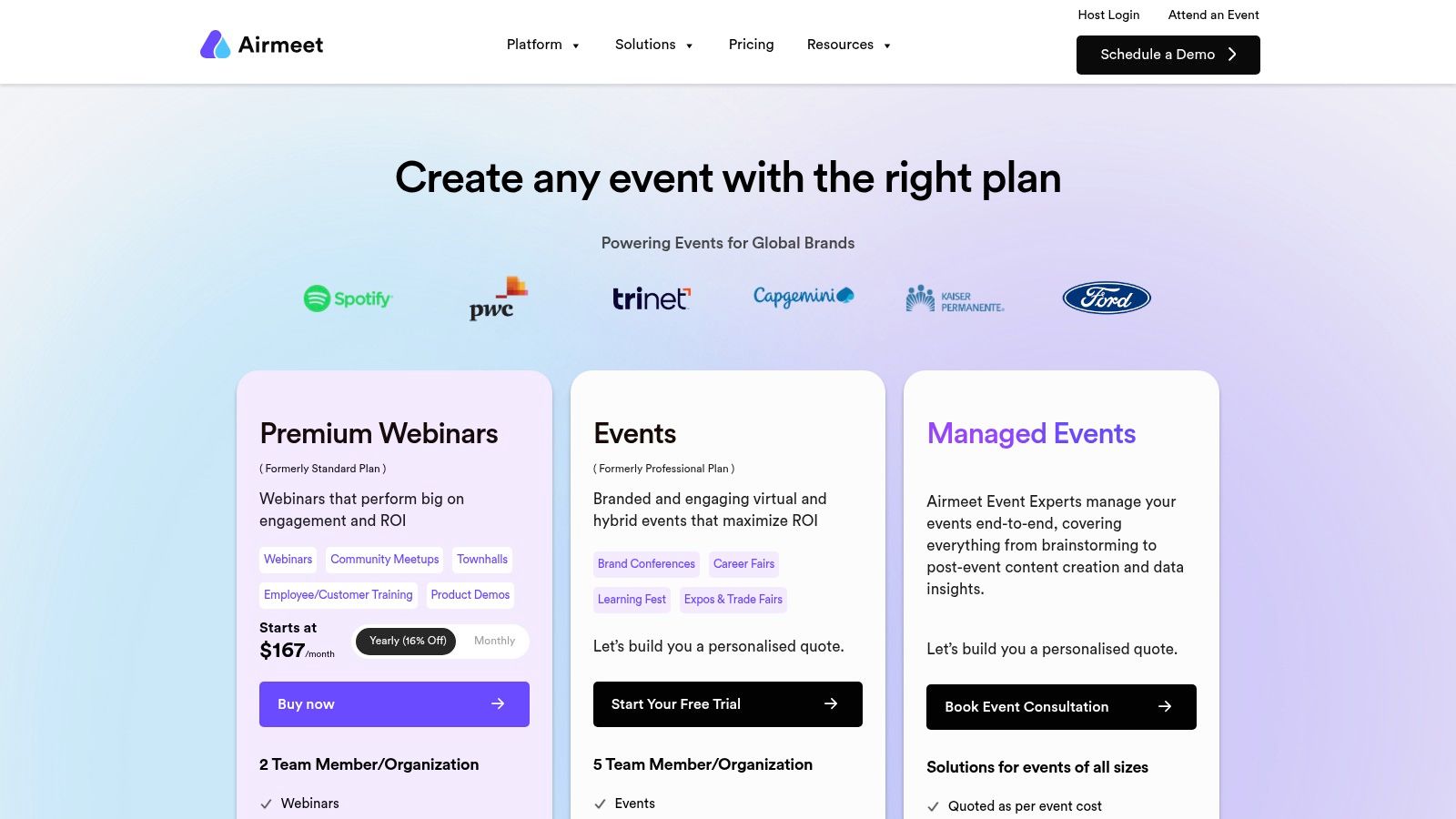
From a sponsorship perspective, Airmeet provides robust, customizable virtual booths that allow partners to display branding, share resources, and interact directly with attendees. The platform’s analytics offer deep insights into booth traffic and engagement metrics, enabling organizers to demonstrate clear ROI for their sponsors. With multi-track agendas, simulive capabilities for pre-recorded content, and a modern user interface, Airmeet gives organizers the tools to execute a sophisticated event that feels both professional and highly interactive. Its managed event services also provide a white-glove option for teams needing extra production support.
Key Details & Use Case
- Best For: Mid-market organizations, professional communities, and trade shows that need strong networking and sponsor engagement features without a massive enterprise budget.
- Pros: Modern user experience with notable engagement tools, scalable to larger events, and transparent pricing for webinar-style events.
- Cons: Full conference and hybrid event pricing is quote-based, and some advanced enterprise features are locked into higher pricing tiers.
- Pricing: View Airmeet pricing
6. vFairs
For organizations aiming to create a highly immersive and visually rich experience, vFairs is one of the best virtual conference platforms, particularly for events like trade shows, job fairs, and large-scale branded conferences. Its strength lies in its ability to build fully customizable 2D and 3D virtual environments that mirror the look and feel of a physical venue. This high-touch approach, backed by dedicated project management, allows sponsorship teams to create compelling virtual booths and interactive exhibitor halls that drive engagement and deliver clear ROI for partners.
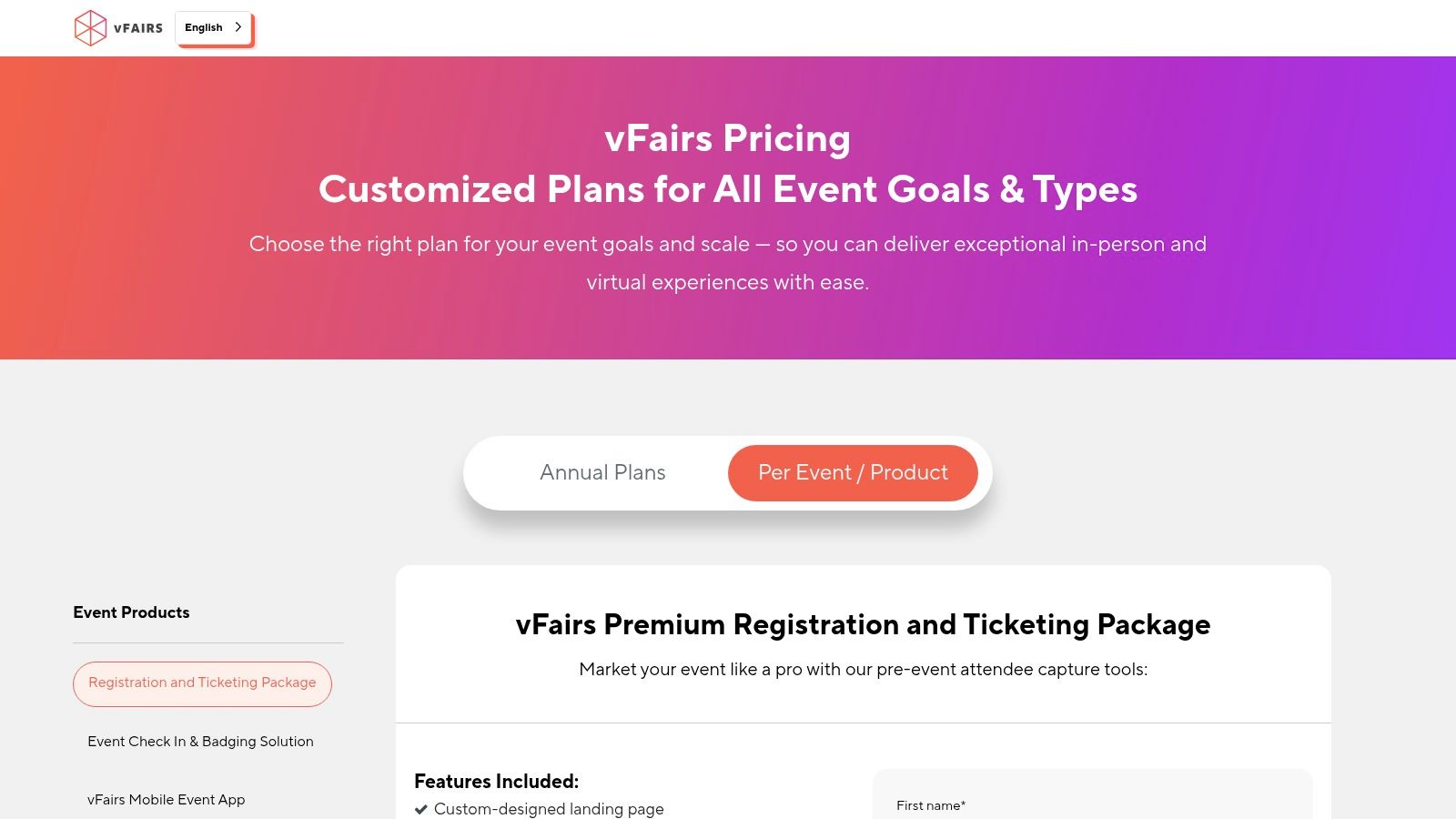
The platform goes beyond just aesthetics, offering a comprehensive suite of tools designed for complex event logistics. It supports registration, ticketing, webinar hosting via RTMP or Zoom, and extensive sponsor visibility features. Unique offerings like virtual poster halls and dedicated networking lounges provide attendees with diverse ways to interact with content and each other. For organizers targeting sponsorships, the platform’s detailed analytics provide crucial data on booth traffic, document downloads, and chat interactions, helping to quantify sponsor value effectively.
Key Details & Use Case
- Best For: Large-scale expos, career fairs, and brand-centric corporate conferences where creating an immersive, custom-branded environment is a top priority for engaging sponsors and attendees.
- Pros: White-glove service with dedicated project managers, highly customizable 3D environments, and powerful tools for sponsor ROI.
- Cons: Pricing is custom and can be high, with advanced 3D designs and add-ons often incurring separate fees.
- Pricing: Request vFairs pricing
7. Whova (Virtual Conference Platform)
For event organizers in the academic and association sectors, Whova has established itself as one of the best virtual conference platforms by unifying the entire event experience into a powerful web and mobile application. Its strength lies in logistics management and community engagement, seamlessly integrating agendas, live streaming, exhibitor halls, and dynamic networking into one cohesive hub. The platform is particularly adept at handling complex content formats common in these sectors, such as digital poster sessions and research galleries.
Whova excels at creating an interactive and organized environment that keeps attendees engaged beyond the main stage. Features like virtual booths for sponsors and exhibitors, coupled with community boards and attendee matchmaking, foster valuable connections. The ability to create tiered access levels allows organizers to control content visibility for different attendee groups, a crucial feature for managing complex registration packages. While streaming is facilitated through integrations with tools like Zoom or YouTube rather than being native, its organizer workflows are exceptionally user-friendly.
Key Details & Use Case
- Best For: Associations, universities, and scientific conferences that require robust agenda management, attendee networking, and specialized content modules like poster sessions.
- Pros: Strong mobile and web accessibility, simplified backend for organizers, and wide adoption in its target markets, which boosts attendee familiarity.
- Cons: Streaming relies on third-party integrations, and pricing is entirely quote-based, requiring direct sales contact for a cost estimate.
- Pricing: Request a Whova pricing quote
8. Cvent Attendee Hub (within Cvent’s Total Event Platform)
For large-scale corporate and institutional events requiring enterprise-grade governance, Cvent’s Attendee Hub is a cornerstone of one of the most comprehensive event ecosystems available. It is not just a standalone virtual platform; it is an integrated component of Cvent’s Total Event Platform, designed to manage the entire event lifecycle from registration and marketing to the final analytics report. This end-to-end approach makes it one of the best virtual conference platforms for organizations that need a single source of truth for all event data, ensuring consistency across virtual, hybrid, and in-person formats.
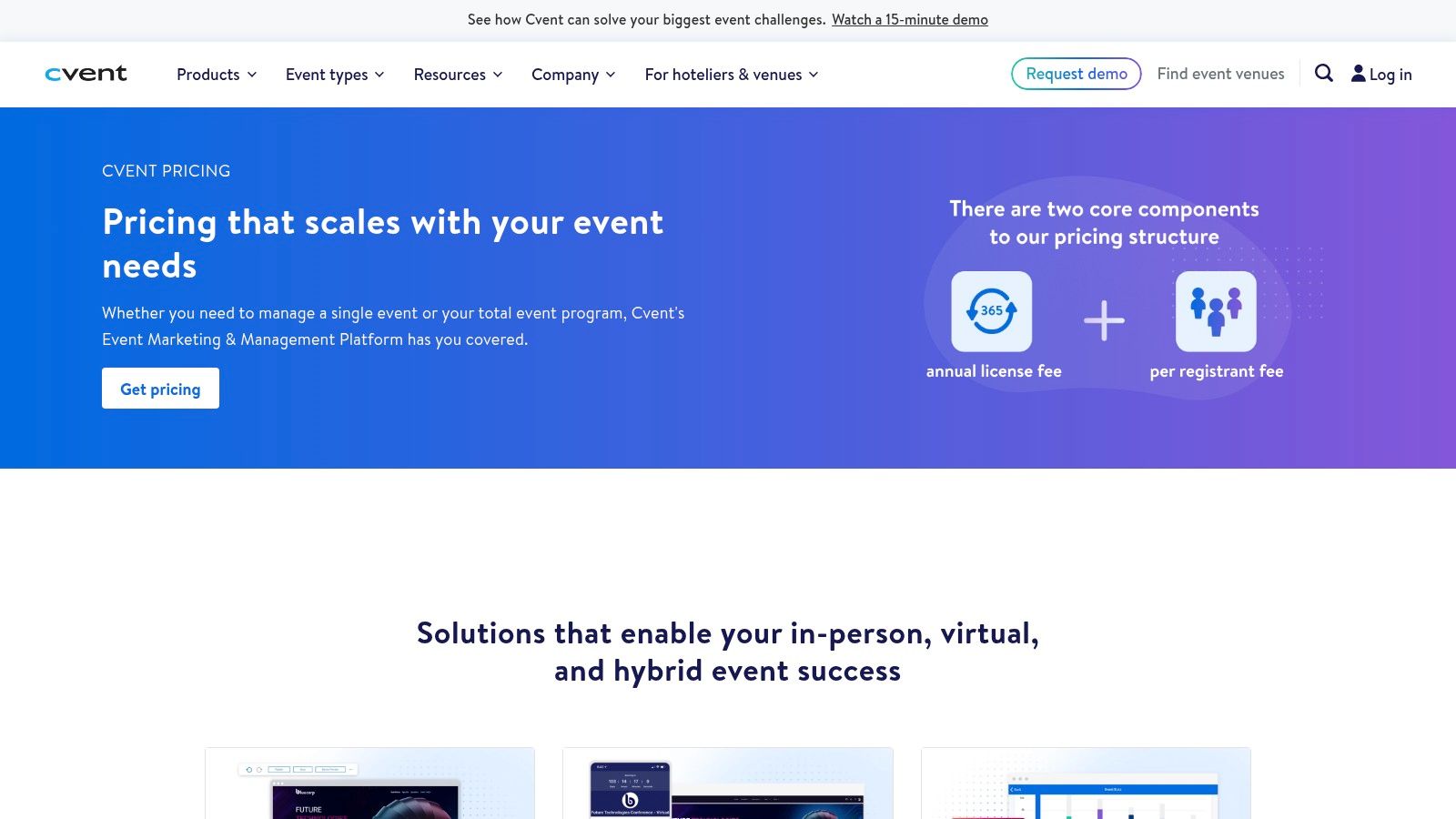
The platform excels at complex agenda and session management, offering robust branding opportunities and powerful tools for exhibitors and sponsors to capture leads. Its strength lies in its scalability and control, with features like API access and SSO integration that are critical for corporate IT compliance. For sponsorship teams, Cvent's integrated exhibitor tools are a major draw, providing clear ROI tracking. Understanding how platforms like this operate can provide valuable insights, similar to those gained by analyzing major industry events; you can explore details for the upcoming Cvent Connect Europe conference here.
Key Details & Use Case
- Best For: Enterprise-level corporations, large associations, and educational institutions that manage a portfolio of complex, large-scale events and require a unified, data-centric platform.
- Pros: True end-to-end event management, extensive customization and branding, and a strong ecosystem with excellent customer support for complex deployments.
- Cons: Quote-based pricing can be opaque, potential for overage fees, and the implementation process can be too complex for simple, one-off events.
- Pricing: Request Cvent pricing details
9. Bizzabo (Event Experience OS)
For large marketing teams and agencies managing a portfolio of events, Bizzabo positions itself as a comprehensive Event Experience OS. This all-in-one platform is engineered to handle the entire event lifecycle for virtual, hybrid, and in-person formats, making it one of the best virtual conference platforms for enterprise-level programs. It moves beyond simple streaming to provide a deeply integrated suite of tools designed to maximize engagement, data collection, and ROI across multiple events.
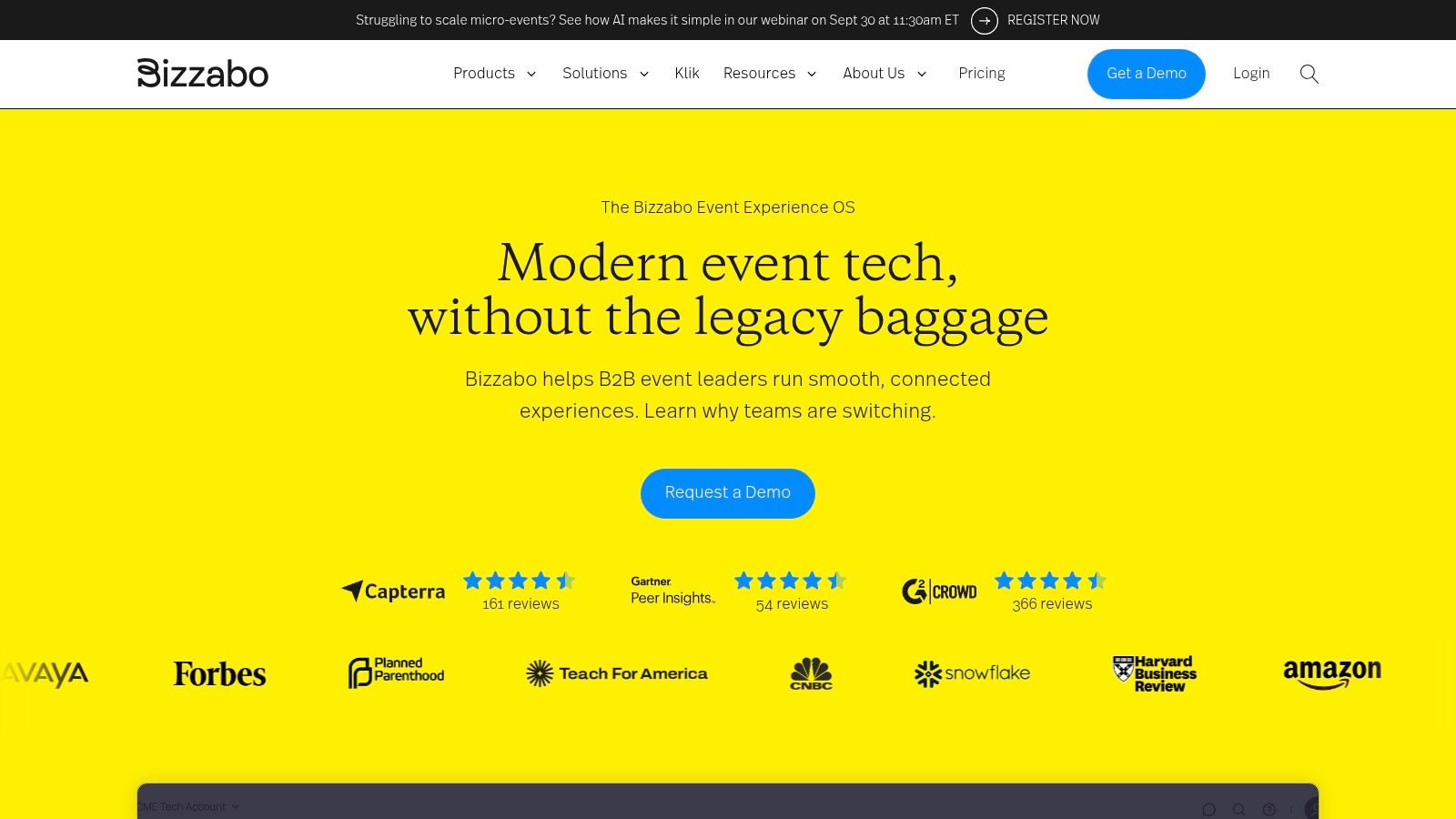
Bizzabo excels at creating sophisticated user journeys with dedicated registration pages, event websites, and mobile apps. For sponsors, the platform offers powerful activation tools and AI-powered matchmaking to connect them with the right attendees, a critical feature for demonstrating value. Its studio-quality production capabilities ensure a polished broadcast, while optional smart badges for in-person components provide invaluable onsite analytics. Event organizers can see the platform's capabilities firsthand by exploring a listing for Bizzabo's Event Tech Showcase Series to understand its robust feature set.
Key Details & Use Case
- Best For: Enterprise organizations and event agencies that require a single, powerful platform to manage a continuous calendar of complex virtual, hybrid, and in-person events.
- Pros: Truly all-in-one solution for the entire event lifecycle, unlimited events and registrations included in the core license, and strong data analytics capabilities.
- Cons: The platform comes with a high entry price point, and costs can increase significantly with add-ons for features like onsite solutions or advanced services.
- Pricing: Contact Bizzabo for a custom quote
10. Hubilo
For marketers aiming to maximize engagement and extend the life of their event content, Hubilo stands out as one of the best virtual conference platforms. It is built from the ground up to support the entire event lifecycle, from initial registration to post-event content repurposing. The platform excels at creating immersive, branded experiences for webinars, hybrid events, and full-scale virtual conferences with its built-in 1080p studio production capabilities.
A key differentiator for Hubilo is its focus on content and lead generation. The AI-powered content hub automatically transforms long-form sessions into "snackable" clips, making it easier to drive continued engagement after the event concludes. For sponsorship teams, in-event lead scoring and dedicated meeting schedulers provide clear pathways to measure ROI and connect partners with high-value attendees. This focus on post-event value and sales integration makes it a strategic choice for organizations where events are a core part of the marketing funnel.
Key Details & Use Case
- Best For: Marketing teams that need a unified platform for both webinars and complex conferences, with a strong emphasis on content repurposing and lead qualification.
- Pros: Transparent pricing for webinar packages, powerful engagement tools, and excellent post-event content workflows that maximize content ROI.
- Cons: Enterprise-level event features require custom quoting, and the extensive feature set can present a learning curve for complex event builds.
- Pricing: View Hubilo pricing
11. BigMarker
BigMarker establishes itself as one of the best virtual conference platforms by offering an exceptional degree of customization and production control. It is designed for marketers and event organizers who need to create a unique, branded experience, moving beyond standard webinar templates. The platform empowers users to build everything from custom registration pages with payment processing to fully branded virtual lobbies and session rooms, ensuring the event feels like an extension of their organization's identity.
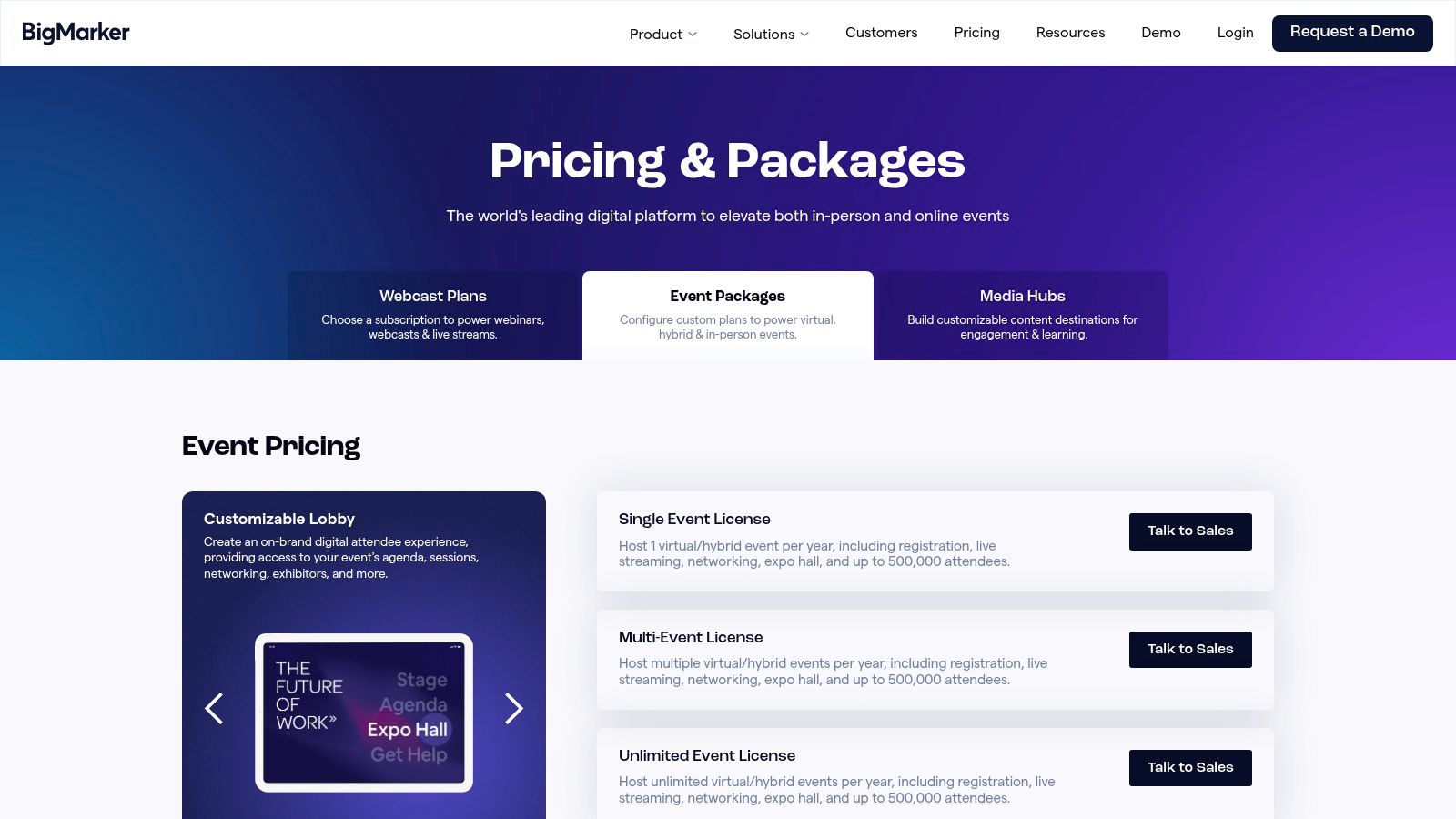
For sponsorship managers, BigMarker’s robust expo areas and media hubs are a significant draw. These features provide tangible assets for sponsorship packages, allowing partners to host content, interact with attendees, and generate leads directly within the platform. The platform also excels in delivering interactive live streams with built-in features like Q&A, polls, and chats that keep audiences engaged. Its ability to support both one-off flagship conferences and recurring webinar series makes it a versatile tool for building a continuous event-led growth strategy.
Key Details & Use Case
- Best For: Marketing teams and event planners requiring deep branding control for large-scale summits, hybrid programs, and revenue-generating webinar series.
- Pros: Strong production and customization options, flexible for recurring and one-off flagship events, and powerful tools for sponsor ROI.
- Cons: Pricing is quote-based which can complicate initial budget planning, and its extensive feature set may be overly complex for simple internal meetings.
- Pricing: View BigMarker pricing
12. EventMobi
EventMobi positions itself as an excellent choice for budget-conscious organizations, particularly US associations, nonprofits, and SMBs, seeking an all-in-one platform without opaque pricing. It provides a comprehensive suite of tools spanning the entire event lifecycle, from registration and mobile apps to virtual experiences and analytics. This makes it one of the best virtual conference platforms for planners who need to manage hybrid or virtual events efficiently within a predictable budget.
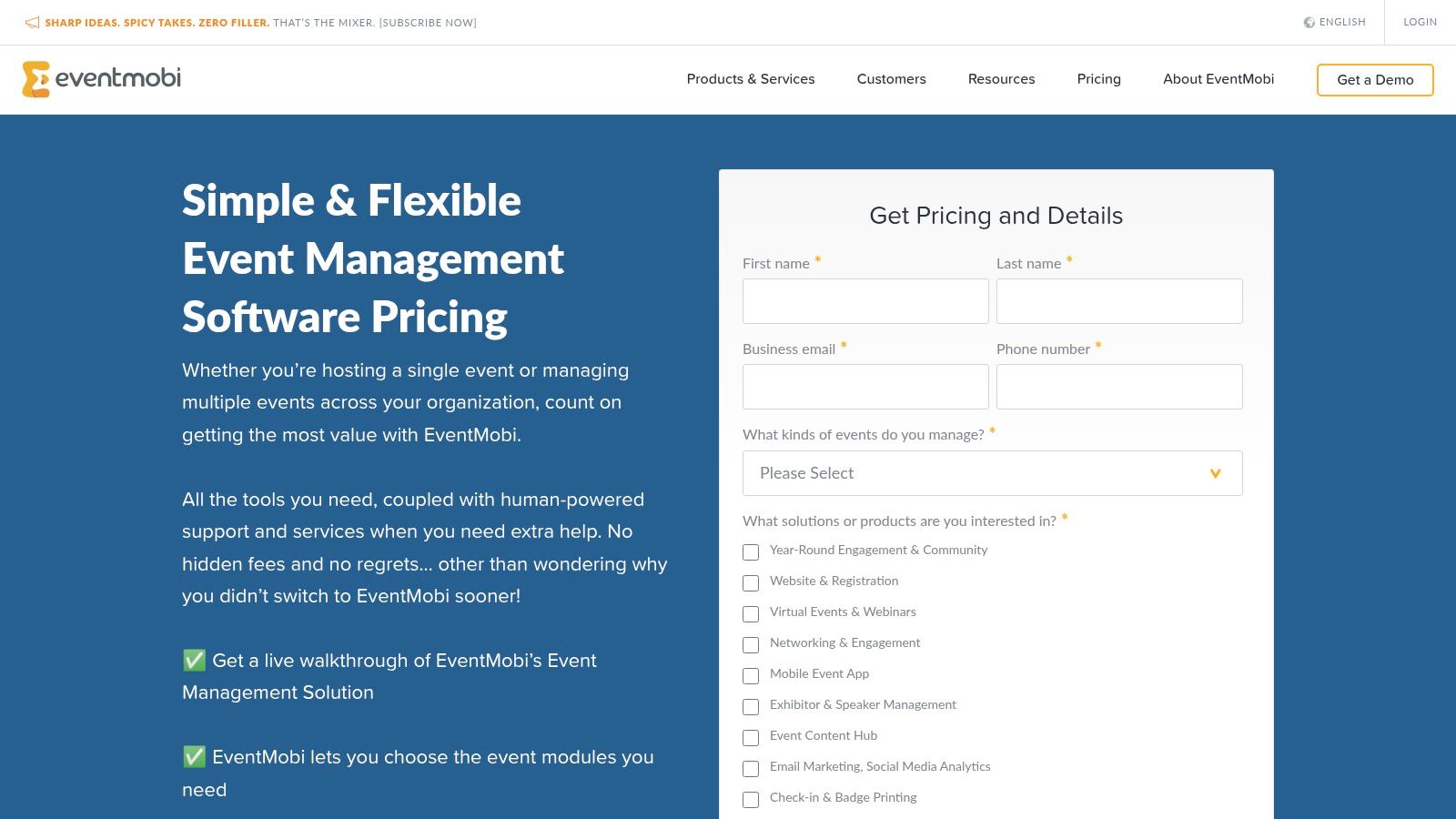
The platform supports a versatile mix of live, simulive, and on-demand content within its virtual event space, enhanced by robust engagement features like polling, Q&A, and gamification. For sponsorship teams, the integrated exhibitor tools with lead capture are essential for demonstrating ROI to partners. By combining these virtual features with onsite solutions like badge printing, EventMobi ensures a cohesive experience for both digital and in-person attendees. To see how platforms like this are evaluated in the industry, you can learn more about event tech showcase conferences and the technologies they feature.
Key Details & Use Case
- Best For: Associations, nonprofits, and small-to-medium businesses needing a feature-rich, cost-effective platform with transparent pricing for hybrid and virtual conferences.
- Pros: Clear, publicly available pricing options, competitive total cost of ownership, and strong professional services and support.
- Cons: Streaming and content storage may be usage-based add-ons, and advanced platform customization might require additional professional services fees.
- Pricing: View EventMobi pricing
Top 12 Virtual Conference Platforms Feature Comparison
| Platform | Core Features & Capabilities | User Experience & Quality ★★★★☆ | Value Proposition & Pricing 💰 | Target Audience 👥 | Unique Selling Points ✨ |
|---|---|---|---|---|---|
| Zoom Events and Webinars | Multi-session agendas, ticketing, expo, 1M viewers cap | Familiar US UX, reliable, strong integrations ★★★★☆ | Scales by attendee count 💰💰 | Enterprises & orgs using Zoom | Massive scale, backstage controls ✨ |
| RingCentral Events | Unlimited events, stages, networking, sponsor tools | Mature feature set, stable platform ★★★★ | Predictable pricing, varies by plan 💰 | SMBs, enterprises seeking Zoom alternative | Straightforward pricing, refined features ✨ |
| Webex Events | Registration, networking, gamification, multilingual | Enterprise security, mobile app focus ★★★★☆ | Enterprise-only, quote-based 💰💰 | US enterprises in Webex Suite | Enterprise-grade security, hybrid workflows ✨ |
| ON24 | Virtual conferences, analytics, AI content repurposing | Deep engagement metrics, large events ★★★★★ | Quote-based, enterprise level 💰💰💰 | Revenue-driven marketing teams | AI content repurposing, marketing automation ✨ |
| Airmeet | Multi-track agendas, networking lounges, CRM integration | Modern UX, engagement tools ★★★★ | Transparent webinar pricing, quotes for full events 💰 | Mid-market conferences & community events | White-glove option, scalable engagement ✨ |
| vFairs | 2D/3D venues, sponsor tools, project management | Highly customizable, dedicated support ★★★★ | Custom pricing + add-ons 💰💰 | Fairs, expos, branded large conferences | Immersive venues, white-glove delivery ✨ |
| Whova | Agendas, streaming, exhibitors, networking, sponsor | Strong mobile/web, easy workflows ★★★★ | Quote-based, tiered pricing 💰 | Associations, universities | Widely adopted in academia ✨ |
| Cvent Attendee Hub | Registration, session mgmt, lead capture, governance | End-to-end coverage, strong support ★★★★☆ | Quote-based, can include overage fees 💰💰 | Large corporations, education institutions | Comprehensive ecosystem, enterprise focus ✨ |
| Bizzabo | Event OS, production, AI matchmaking, sponsor activations | Enterprise-ready, unlimited events ★★★★☆ | Higher entry price, costly add-ons 💰💰 | Marketing teams, agencies | AI matchmaking, studio-quality production ✨ |
| Hubilo | Multi-track events, studio production, AI content hub | Strong engagement, good post-event tools ★★★★ | Transparent webinar pricing, custom enterprise 💰 | US marketers, hybrid/webinar integrations | AI-powered content repurposing ✨ |
| BigMarker | Custom lobbies, interactive streaming, media hubs | Flexible, strong production ★★★★ | Quote-based 💰 | Conferences, summits, hybrid events | Interactive streaming, customizable hubs ✨ |
| EventMobi | Virtual experiences, polling, sponsor tools, badge printing | Clear pricing, competitive cost ★★★★ | Published pricing, usage-based add-ons 💰 | Associations, nonprofits, SMBs | Budget-friendly, strong support ✨ |
Making a Data-Driven Decision for Your Next Event
Selecting the right technology from our comprehensive list of the best virtual conference platforms is a critical strategic decision, not merely a logistical one. Our analysis of platforms from Zoom Events to Cvent Attendee Hub reveals a market with diverse specializations. There is no single "best" platform, only the one that aligns most effectively with your specific event objectives, sponsorship goals, and audience expectations.
The landscape is defined by key trade-offs. Platforms like ON24 and Hubilo excel at capturing and analyzing attendee engagement data, making them ideal for marketing and sales teams focused on lead generation and pipeline velocity. In contrast, solutions like vFairs and Airmeet prioritize immersive experiences and dynamic networking, which can be crucial for fostering community and delivering high-value sponsor interactions. Meanwhile, established players like Webex Events (formerly Socio) and RingCentral Events (formerly Hopin) offer robust, all-in-one solutions designed for scalability and complex event architectures.
Key Factors for Your Final Evaluation
Before making a final commitment, your team must move beyond feature checklists and focus on strategic alignment. A data-driven approach is paramount. Consider these critical evaluation factors:
- Sponsorship ROI and Activation: How does the platform enable sponsors to generate leads, track engagement, and prove return on investment? Look for features like virtual booths with lead capture, sponsored sessions with detailed analytics, and prominent branding opportunities. Tools like Bizzabo and Whova offer strong sponsorship management modules.
- Data Integration and Analytics: Your virtual event platform should not be a data silo. Assess its native integration capabilities with your core CRM (e.g., Salesforce, HubSpot) and marketing automation systems. Deep integration ensures a seamless flow of lead and engagement data, which is vital for post-event follow-up and calculating ROI. For complex technology stacks, exploring top API integration platforms can unlock sophisticated data synchronization and provide a unified view of your event performance.
- Total Cost of Ownership (TCO): Look beyond the initial license fee. Factor in costs for production support, dedicated account management, add-on modules for features like mobile apps or advanced networking, and any per-attendee charges. A seemingly affordable platform can become expensive as your needs scale.
- Attendee Experience and Engagement: A platform’s true value is measured by its ability to hold an audience's attention. Evaluate the user interface from an attendee's perspective. Is it intuitive? Does it facilitate meaningful connections? Features like gamification, breakout sessions, and AI-powered matchmaking are no longer novelties but essential components for combating virtual fatigue.
Ultimately, the most successful virtual conferences are built on a platform that acts as a strategic partner, not just a passive tool. The best virtual conference platforms are those that provide actionable data, empower your sponsors, and create a seamless, engaging experience for your attendees. Use this guide to shortlist your top contenders, then engage in deep-dive demos focused on your most critical use cases. Your final choice will shape your event's success, directly impacting attendee satisfaction, sponsor retention, and your bottom line.
Ready to amplify your sponsorship strategy? ConferenceDatabase provides unparalleled access to sponsorship data from thousands of events worldwide. Use our platform to identify high-value sponsorship opportunities, analyze competitor strategies, and connect with the right decision-makers to ensure your next conference exceeds its revenue goals. Discover your next sponsorship opportunity with ConferenceDatabase.